Coccidiosis is a common and very serious parasite issue that every chicken keeper should know about before the first chick’s feet hit the brooder floor. With a little common sense and good flock management practices, coccidiosis can be controlled and easily treated when necessary.
READER ADVISORY: Actual photos of abnormal droppings below.
WHAT IS COCCIDIOSIS?
Coccidiosis is a common intestinal disease caused by several species of parasites. When these parasites rapidly multiply in a chicken’s gut, they damage the intestine lining, preventing chickens from absorbing nutrients from their food. Both adults and chicks can suffer from coccidiosis, however it can quickly claim the lives of baby chicks given their fragile, developing immune systems.
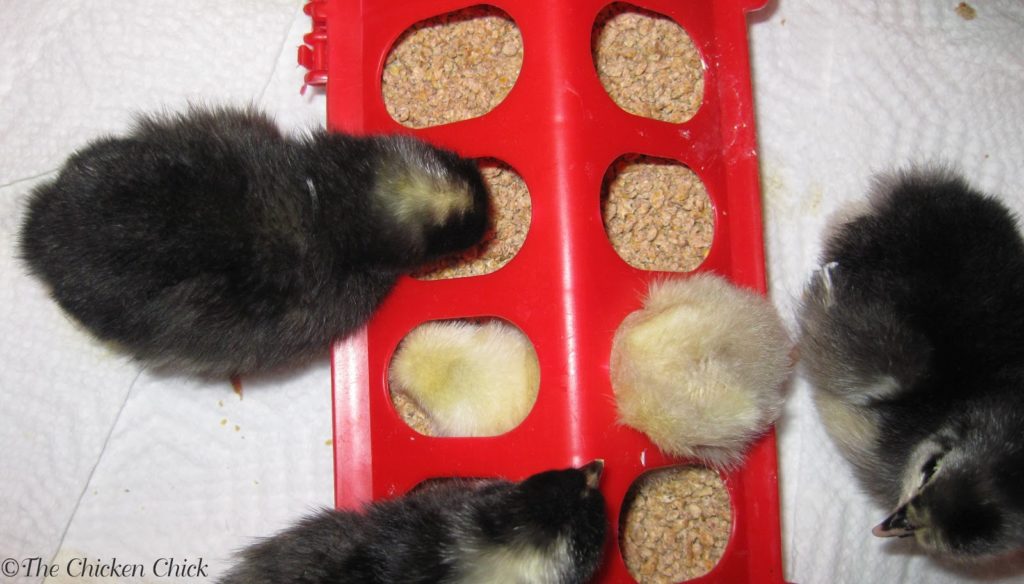 The microscopic protozoa that cause coccidiosis are everywhere chickens are, so understanding litter and sanitation best practices are essential to protecting chickens’ gut health. The key to keeping chickens healthy is learning to control the spread of the parasite, recognizing the symptoms when they occur, obtaining a definitive diagnosis and knowing how to treat affected birds.
The microscopic protozoa that cause coccidiosis are everywhere chickens are, so understanding litter and sanitation best practices are essential to protecting chickens’ gut health. The key to keeping chickens healthy is learning to control the spread of the parasite, recognizing the symptoms when they occur, obtaining a definitive diagnosis and knowing how to treat affected birds.SYMPTOMS
The most common symptoms of coccidiosis are:
- diarrhea and/or blood and/or mucous in droppings
- lethargy, listlessness
- ruffled looking feathers
- pale skin color
- loss of appetite
- weight loss in older chickens
- failure of chicks to grow/thrive
- progression of symptoms can be gradual or rapidly result in death, particularly in chicks
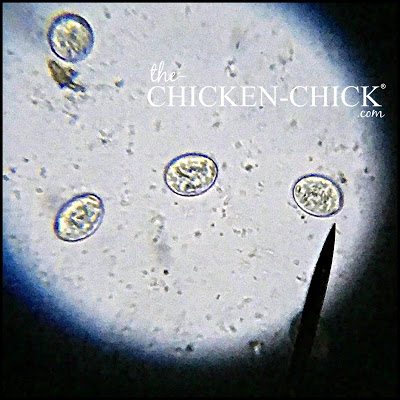
HOW IS IT SPREAD?
Microscopic eggs, called oocysts, are ingested, then multiply in the intestines and are expelled in droppings. The eggs can be carried by wild birds, chickens from different flocks, on a person’s shoes, clothing or equipment. Cocci is commonly transmitted through dirty water or contaminated food. There are a number of species of Coccidia that affect chickens and immunity can be acquired by gradual exposure over time.
An example of how easily flocks can become infected:
Farmer Fred’s flock appears healthy and possesses immunity to the particular species of oocysts living in his yard. Fred finishes up his morning coop chores and walks over to farmer Betty’s chicken yard with his shovel to help her dig some fence posts. Oocysts travel with him on the soles of his boots, his shovel and his clothes and are deposited in Betty’s yard. The grass is contaminated with the eggs, which is then eaten by Betty’s grazing hens and they get sick with coccidiosis within a week of the visit. Fred walks home, bringing oocysts from Betty’s yard with him to his hens on his boots and shovel and his birds began dying. Betty’s flock is not immune to the cocci species in Fred’s flock and vice versa.
PREVENTION
- Have day old chicks inoculated with the coccidiosis vaccine. Most hatcheries offer this service at a nominal charge. Do NOT feed medicated starter feed to chicks that have been inoculated with the coccidiosis vaccine because the amprolium in the medicated feed will kill the live vaccine.
- Provide medicated starter feed to chicks that are not vaccinated for coccidiosis for 18 weeks. The amprolium in medicated feed keeps the coccidia population down to manageable numbers in the gut as chicks develop their resistance to it over time.
- Keep brooders and coops clean and DRY, DRY, DRY! Warm, wet conditions such as those in a dirty, damp brooder provides the ideal environment for coccidia to rapidly multiply.
- Provide the cleanest water possible. Chickens cannot be healthy if they are drinking sewage water. It is a best practice to use poultry nipple drinkers.
- Don’t overcrowd living quarters (provide a minimum of: 4 square feet per adult
bird inside coops, 10 square feet per bird in the run, and 6 square inches of
brooder flooring for week old chicks, increasing space as they grow. - Ensure litter is kept DRY.
- Offer chicks starter feed containing probiotics for 18 weeks to promote competitive exclusion. Most commercial starter feeds already contain probiotics and prebiotics. It is not helpful to offer more.
- Practice good bio-security, including quarantining new flock members for a bare minimum of two weeks, restricting access to your chicken yard by fellow
chicken-keepers, not sharing equipment with fellow chicken-keepers. (much more detail about proper quarantine here) - Keep waterfowl separate from chickens (spilled water + warmth=ideal conditions for multiplying coccidia)
- Don’t throw feed or treats on the ground where it can become contaminated.

DIAGNOSIS
The only way to accurately diagnose coccidiosis in a live chicken is to have a fecal float test performed by a vet. Most veterinarians will gladly perform this test for a nominal fee, if any, even if they do not treat chickens.
The following two photos illustrate that not all blood in droppings is caused by cocci or worms. Both of these samples were tested by my vet’s laboratory and were NEGATIVE for cocci and worms.
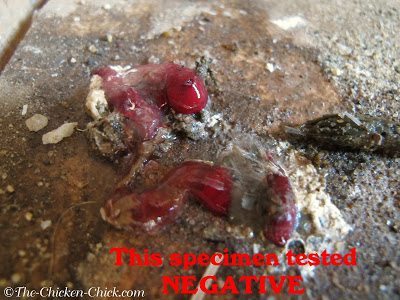
The sooner coccdiosis identified, the sooner treatment can begin and the lower the risk of death. It is extremely helpful to have a droppings board in the coop in order to make a daily droppings assessment. Abnormal or bloody droppings should be tested.
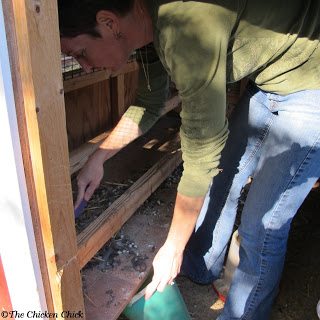
WARNING!
In the book, Hatching and Brooding Your Own Chicks, author Gail Damerow, leading authority on all things chicken, warns of the danger of the old wives’ tale that suggests coccidiosis can be prevented or cured by feeding herbs, garlic, vinegar, milk or yogurt. Damerow is emphatic in her response: “No. No. No. No. And no. These notions are dangerous and can jeopardize the health, and lives, of your [chicks]. Certain herbs, as well as vinegar and yogurt, may be used in moderation to enhance the immunity and overall health of poultry. But too much garlic can cause anemia and therefore is hazardous to their health. Milk, in more than minor quantities, causes diarrhea, which is not a healthful condition in baby birds, especially if they are already sick. Before modern drugs became available, milk sometimes was used as a flush to induce diarrhea to clean out the intestines of poultry infected with coccidiosis. Today, instead of spreading coccidial protozoa from the loosened bowels of infected birds, we have a variety of drugs called coccidiocides that destroy the parasites and reliably cure birds of the disease. A young bird with coccidiosis is a seriously ill bird. Don’t gamble with its life by treating it with ineffective alternative ‘natural’ products.” (emphasis added)
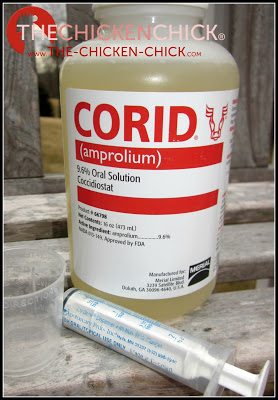
TREATMENT
When one chicken is diagnosed with coccidiosis, the entire flock must be treated.
The chickens that produced the droppings in the following photos were diagnosed with coccidiosis. Following the advice of my vet, I treated my flock with 9.5cc of liquid amprolium (brand name Corid) per gallon of water for 4 days. The droppings were free of blood within 24 hours of the first dose, however, in 2 weeks, they were again medicated for 3 additional days. (The vet indicated that given the life cycle of Eimeria, no bugs would be present to kill less than two weeks after stopping treatment, hence the 2 week break in dosing.)

The dosage for Corid 20% Soluble Powder is 1/2 teaspoon per gallon of water. Offer as the only source of drinking water for 5 days.
NO EGG WITHDRAWAL PERIOD
Amprolium is approved for use in laying hens by the FDA, which means there is no egg withdrawal period. Eggs laid by hens may be eaten during and after treatment with amprolium.
POST-TREATMENT
AFTER the second round of treatment for cocci is completed, particularly when using amprolium, a vitamin supplement should be given to replace the Vitamin B1 lost during treatment. A product such as Nutri-Drench will do the trick.
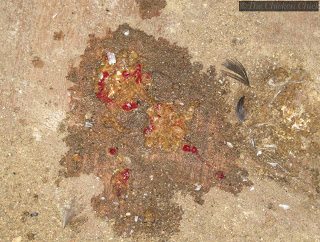
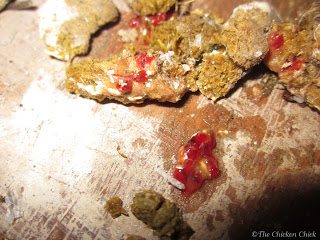
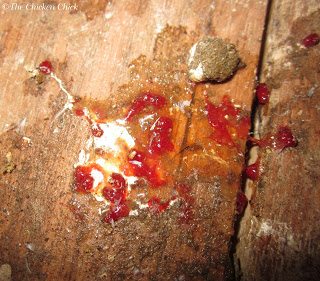
VIEWER ADVISORY: The following video is an excellent presentation on the subject of cocci, however, it is extremely graphic and difficult to watch. There are overcrowding conditions and dead or dying birds shown in both clinical and brooder settings.
Further reading and sources:
http://cal.vet.upenn.edu/projects/parasit06/website/lab2.htm
http://www.accessdata.fda.gov/scripts/AnimalDrugsAtFDA/index.cfm?gb=2
http://animalhealth.pfizer.com/sites/pahweb/US/EN/Conditions/Pages/Coccidiosis.aspx
http://www.millerhatcheries.com/Information/Diseases/coccidiosis.htm
http://www.thepoultrysite.com/publications/2/Coccidiosis%20Management/46/drugs
The Chicken Health Handbook, Damerow, Gail. Storey Publishing, 1994.
Kathy Shea Mormino
Affectionately known internationally as The Chicken Chick®, Kathy Shea Mormino shares a fun-loving, informative style to raising backyard chickens. …Read on


shop my SPONSORS
Coccidiosis is a common and very serious parasite issue that every chicken keeper should know about before the first chick’s feet hit the brooder floor. With a little common sense and good flock management practices, coccidiosis can be controlled and easily treated when necessary.
READER ADVISORY: Actual photos of abnormal droppings below.
WHAT IS COCCIDIOSIS?
Coccidiosis is a common intestinal disease caused by several species of parasites. When these parasites rapidly multiply in a chicken’s gut, they damage the intestine lining, preventing chickens from absorbing nutrients from their food. Both adults and chicks can suffer from coccidiosis, however it can quickly claim the lives of baby chicks given their fragile, developing immune systems.
 The microscopic protozoa that cause coccidiosis are everywhere chickens are, so understanding litter and sanitation best practices are essential to protecting chickens’ gut health. The key to keeping chickens healthy is learning to control the spread of the parasite, recognizing the symptoms when they occur, obtaining a definitive diagnosis and knowing how to treat affected birds.
The microscopic protozoa that cause coccidiosis are everywhere chickens are, so understanding litter and sanitation best practices are essential to protecting chickens’ gut health. The key to keeping chickens healthy is learning to control the spread of the parasite, recognizing the symptoms when they occur, obtaining a definitive diagnosis and knowing how to treat affected birds.SYMPTOMS
The most common symptoms of coccidiosis are:
- diarrhea and/or blood and/or mucous in droppings
- lethargy, listlessness
- ruffled looking feathers
- pale skin color
- loss of appetite
- weight loss in older chickens
- failure of chicks to grow/thrive
- progression of symptoms can be gradual or rapidly result in death, particularly in chicks

HOW IS IT SPREAD?
Microscopic eggs, called oocysts, are ingested, then multiply in the intestines and are expelled in droppings. The eggs can be carried by wild birds, chickens from different flocks, on a person’s shoes, clothing or equipment. Cocci is commonly transmitted through dirty water or contaminated food. There are a number of species of Coccidia that affect chickens and immunity can be acquired by gradual exposure over time.
An example of how easily flocks can become infected:
Farmer Fred’s flock appears healthy and possesses immunity to the particular species of oocysts living in his yard. Fred finishes up his morning coop chores and walks over to farmer Betty’s chicken yard with his shovel to help her dig some fence posts. Oocysts travel with him on the soles of his boots, his shovel and his clothes and are deposited in Betty’s yard. The grass is contaminated with the eggs, which is then eaten by Betty’s grazing hens and they get sick with coccidiosis within a week of the visit. Fred walks home, bringing oocysts from Betty’s yard with him to his hens on his boots and shovel and his birds began dying. Betty’s flock is not immune to the cocci species in Fred’s flock and vice versa.
PREVENTION
- Have day old chicks inoculated with the coccidiosis vaccine. Most hatcheries offer this service at a nominal charge. Do NOT feed medicated starter feed to chicks that have been inoculated with the coccidiosis vaccine because the amprolium in the medicated feed will kill the live vaccine.
- Provide medicated starter feed to chicks that are not vaccinated for coccidiosis for 18 weeks. The amprolium in medicated feed keeps the coccidia population down to manageable numbers in the gut as chicks develop their resistance to it over time.
- Keep brooders and coops clean and DRY, DRY, DRY! Warm, wet conditions such as those in a dirty, damp brooder provides the ideal environment for coccidia to rapidly multiply.
- Provide the cleanest water possible. Chickens cannot be healthy if they are drinking sewage water. It is a best practice to use poultry nipple drinkers.
- Don’t overcrowd living quarters (provide a minimum of: 4 square feet per adult
bird inside coops, 10 square feet per bird in the run, and 6 square inches of
brooder flooring for week old chicks, increasing space as they grow. - Ensure litter is kept DRY.
- Offer chicks starter feed containing probiotics for 18 weeks to promote competitive exclusion. Most commercial starter feeds already contain probiotics and prebiotics. It is not helpful to offer more.
- Practice good bio-security, including quarantining new flock members for a bare minimum of two weeks, restricting access to your chicken yard by fellow
chicken-keepers, not sharing equipment with fellow chicken-keepers. (much more detail about proper quarantine here) - Keep waterfowl separate from chickens (spilled water + warmth=ideal conditions for multiplying coccidia)
- Don’t throw feed or treats on the ground where it can become contaminated.

DIAGNOSIS
The only way to accurately diagnose coccidiosis in a live chicken is to have a fecal float test performed by a vet. Most veterinarians will gladly perform this test for a nominal fee, if any, even if they do not treat chickens.
The following two photos illustrate that not all blood in droppings is caused by cocci or worms. Both of these samples were tested by my vet’s laboratory and were NEGATIVE for cocci and worms.

The sooner coccdiosis identified, the sooner treatment can begin and the lower the risk of death. It is extremely helpful to have a droppings board in the coop in order to make a daily droppings assessment. Abnormal or bloody droppings should be tested.

WARNING!
In the book, Hatching and Brooding Your Own Chicks, author Gail Damerow, leading authority on all things chicken, warns of the danger of the old wives’ tale that suggests coccidiosis can be prevented or cured by feeding herbs, garlic, vinegar, milk or yogurt. Damerow is emphatic in her response: “No. No. No. No. And no. These notions are dangerous and can jeopardize the health, and lives, of your [chicks]. Certain herbs, as well as vinegar and yogurt, may be used in moderation to enhance the immunity and overall health of poultry. But too much garlic can cause anemia and therefore is hazardous to their health. Milk, in more than minor quantities, causes diarrhea, which is not a healthful condition in baby birds, especially if they are already sick. Before modern drugs became available, milk sometimes was used as a flush to induce diarrhea to clean out the intestines of poultry infected with coccidiosis. Today, instead of spreading coccidial protozoa from the loosened bowels of infected birds, we have a variety of drugs called coccidiocides that destroy the parasites and reliably cure birds of the disease. A young bird with coccidiosis is a seriously ill bird. Don’t gamble with its life by treating it with ineffective alternative ‘natural’ products.” (emphasis added)

TREATMENT
When one chicken is diagnosed with coccidiosis, the entire flock must be treated.
The chickens that produced the droppings in the following photos were diagnosed with coccidiosis. Following the advice of my vet, I treated my flock with 9.5cc of liquid amprolium (brand name Corid) per gallon of water for 4 days. The droppings were free of blood within 24 hours of the first dose, however, in 2 weeks, they were again medicated for 3 additional days. (The vet indicated that given the life cycle of Eimeria, no bugs would be present to kill less than two weeks after stopping treatment, hence the 2 week break in dosing.)

The dosage for Corid 20% Soluble Powder is 1/2 teaspoon per gallon of water. Offer as the only source of drinking water for 5 days.
NO EGG WITHDRAWAL PERIOD
Amprolium is approved for use in laying hens by the FDA, which means there is no egg withdrawal period. Eggs laid by hens may be eaten during and after treatment with amprolium.
POST-TREATMENT
AFTER the second round of treatment for cocci is completed, particularly when using amprolium, a vitamin supplement should be given to replace the Vitamin B1 lost during treatment. A product such as Nutri-Drench will do the trick.



VIEWER ADVISORY: The following video is an excellent presentation on the subject of cocci, however, it is extremely graphic and difficult to watch. There are overcrowding conditions and dead or dying birds shown in both clinical and brooder settings.
Further reading and sources:
http://cal.vet.upenn.edu/projects/parasit06/website/lab2.htm
http://www.accessdata.fda.gov/scripts/AnimalDrugsAtFDA/index.cfm?gb=2
http://animalhealth.pfizer.com/sites/pahweb/US/EN/Conditions/Pages/Coccidiosis.aspx
http://www.millerhatcheries.com/Information/Diseases/coccidiosis.htm
http://www.thepoultrysite.com/publications/2/Coccidiosis%20Management/46/drugs
The Chicken Health Handbook, Damerow, Gail. Storey Publishing, 1994.




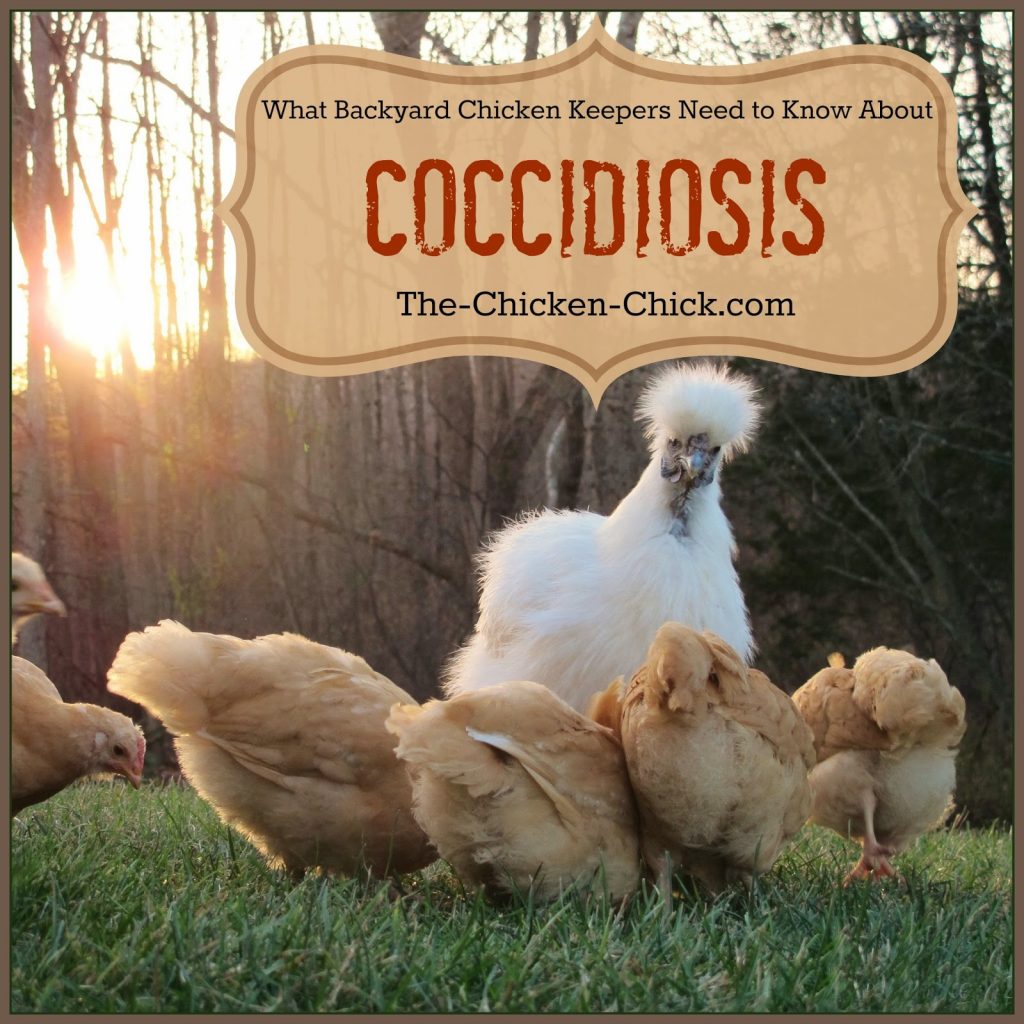
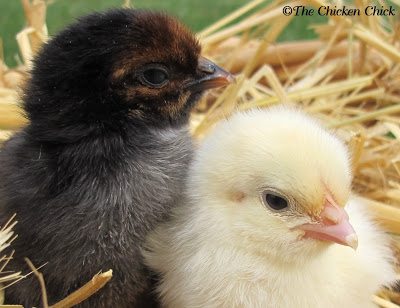
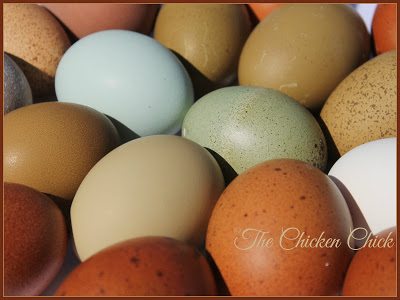







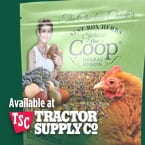

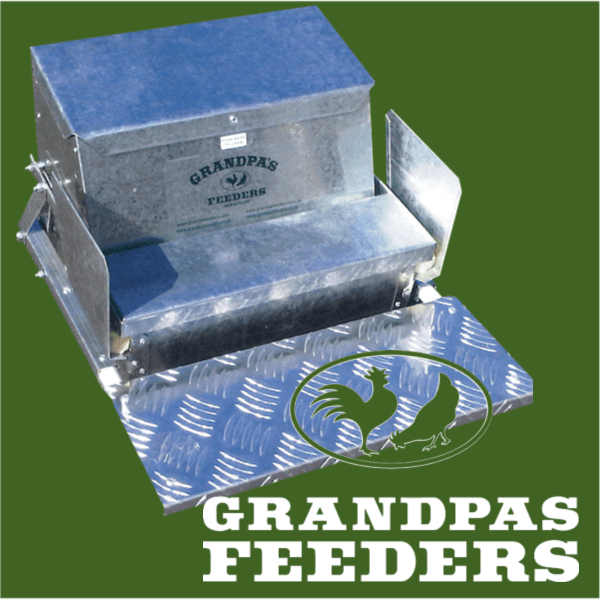


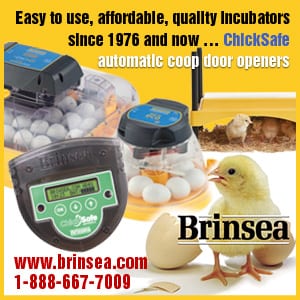



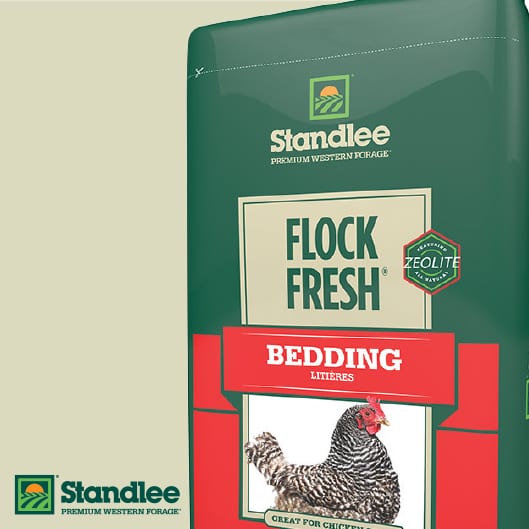
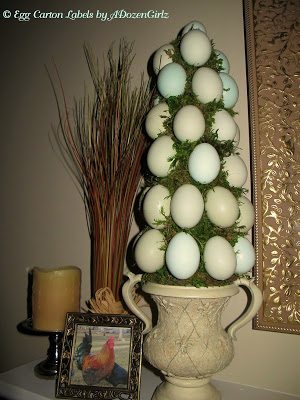

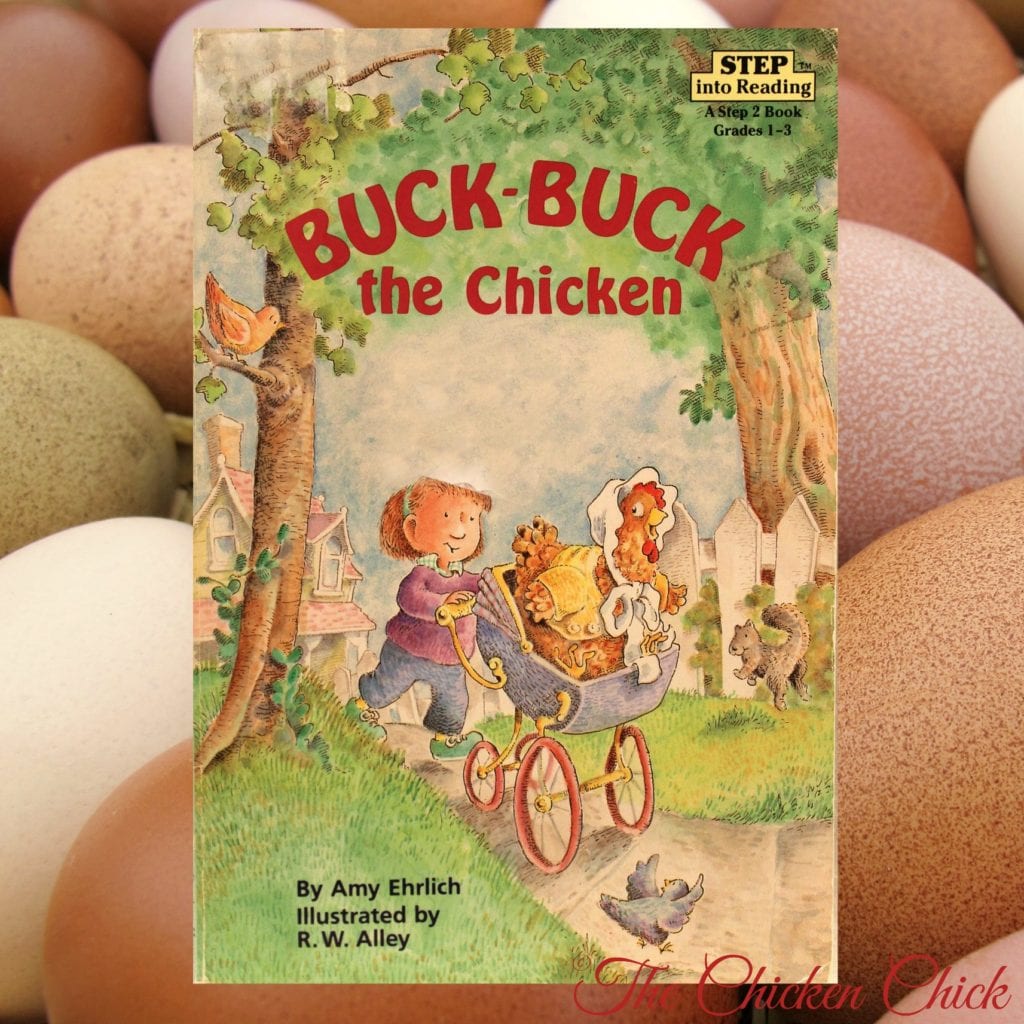













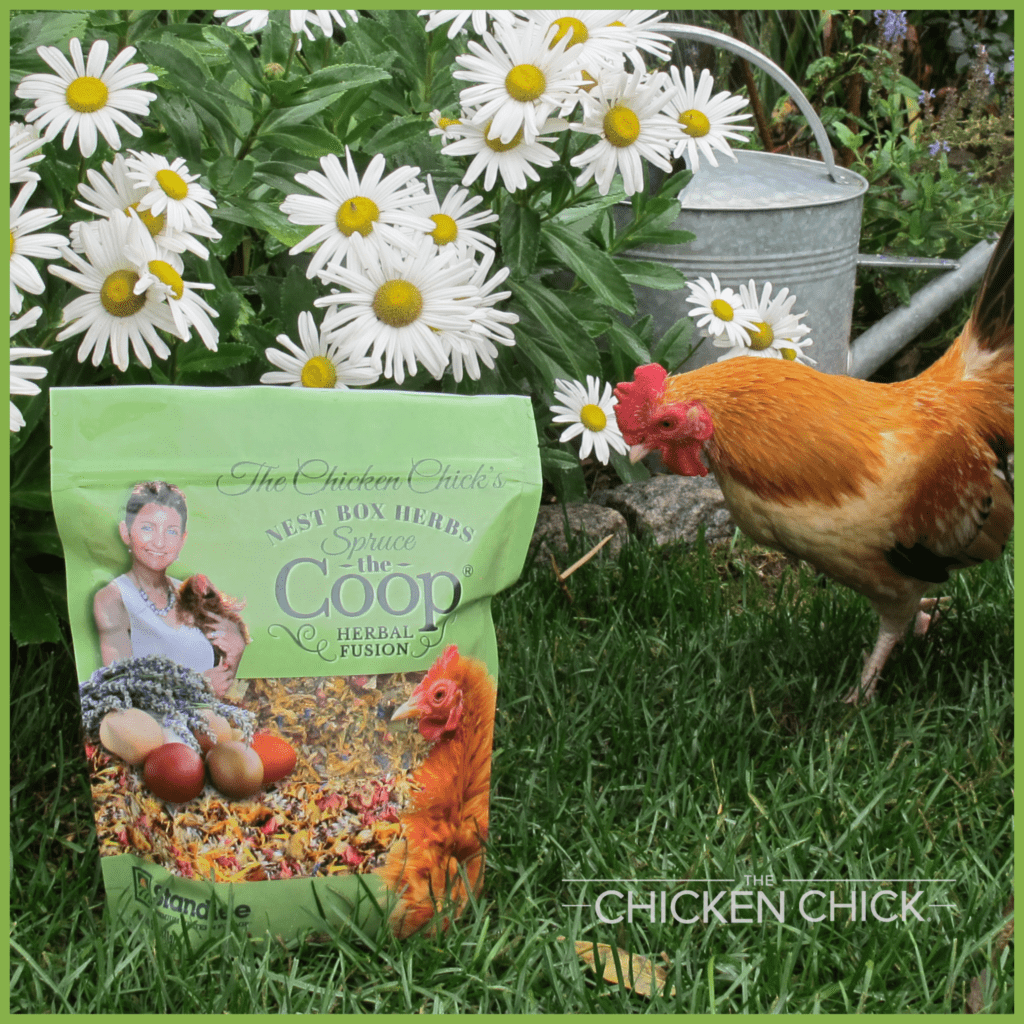

Concerns regarding ‘egg drawback periods” always occur when medication are given to resting birds. Talk about the issue with your vet and use your best verdict. (that's really beneficial, isn't it?)
Incinerador de Grasa
AM from south Africa…i saw this comment on positive blogs and i will love to tell every body how my status changes to negative, and am now a living witness of it and i think its a shame on me if i don't share this lovely story with other people infected with this deadly virus…,hiv has been ongoing in my family… i lost both parents to hiv,. and it is so much pain ive not been able to get over.. as we all know medically there is no solution to it..and medication is very expensive. So someone introduced me to… Read more »
Just an FYI coccidia it's NOT referred to as "cocci". Cocci is short for cocci bacteria ( like staph or strep). Coccidia is caused by a protozoan. If you went into a vet saying you were concerned about cocci you might waste a lot of time and money chasing down the wrong thing. Otherwise, your info is spot on. Thanks!
Hi, buy coxiprol it is available on trademe.co.nz or animal supplies.co.nz exactly same thing as corid.
I have 3 month old chicks that have contracted what I believe to be Cocci. I am treating them with the Corid powder form in their water. I have one 8 month old hen that is with them. She is my only laying hen right now and I was wondering if I could continue eating her eggs? She lays about one every dsy or every other day and I have about 2 dozen right now. Also, can I continue eaing the eggs now that all the chickens are being treated or is it not recommended? Thanks for your response!